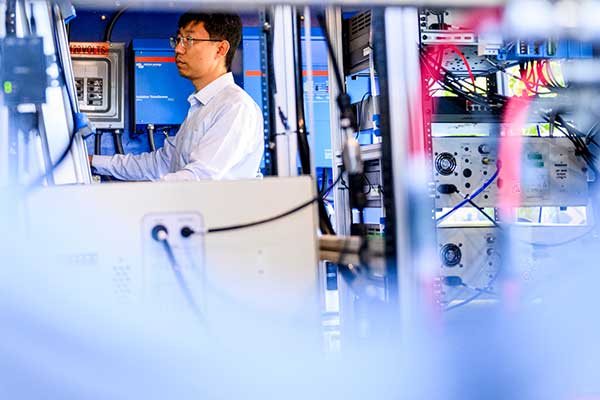“Lab in a Van” Helps Identify Pollution to Improve Air Quality

CEE Assistant Professor Shang Liu talks about Northeastern’s iSUPER mobile lab that helps identify pollution hotspots around Boston in hopes to find solutions to mitigate the impact of poor air quality.
This article originally appeared on Northeastern Global News. It was published by Cynthia McCormick Hibbert. Main photo: Researcher Shang Liu demonstrates how a “lab in a van” operated by Northeastern detects air pollutants. Photo by Matthew Modoono/Northeastern University.
This roving air quality detection van will help Boston neighborhoods breathe easier
Thousands of cars pass through the Boston neighborhood of Allston on the Massachusetts Turnpike every day, emitting fumes that pollute the air around area homes and businesses.
Could one van, operated by a team of researchers from Northeastern, hold the key to cleaner air?
The city of Boston thinks so, funding an effort by the Allston Brighton Health Collaborative to have Northeastern’s iSUPER mobile “lab in a van” identify pollution hotspots in Allston in hopes of finding solutions to the barrage of dirty air.
“We’re going to drive around communities near the Mass Pike” in the iSUPER van filled with the latest technology in air quality monitoring equipment, said Shang Liu, assistant professor of civil and environmental engineering at Northeastern.
The van will measure pollutants such as particulate matter, nitrogen oxides, ozone, carbon monoxide and carbon dioxide within Mass Pike communities and at different distances from the highway to see how far the emission plumes travel into the community, he says.
“One of the goals is to identify emission hotspots,” Liu said. “The data could tell us not just how high the pollutant level is but also where it comes from and through what kind of chemical mechanisms and dynamic processes.”
“We want to understand the sources so that the decision-makers can mitigate them,” he says.
The high resolution data being gathered by the van, developed under the Northeastern University’s impact engine project called Healthier Air and People, The Intelligent Solutions to Urban Pollution for Equity and Resilience (iSUPER), is an important piece of the pollution measurement puzzle.
The Allston Brighton Health Collaborative, the lead agency for the project called Breathe Easy, Allston, Brighton, is also installing stationary air quality sensors inside and outside of homes in the area.
After six months, each home will receive an air purifier, and air quality will be measured for comparison purposes.
Read full story at Northeastern Global News
Related Story: CEE Assistant Professor Shang Liu was featured in the WCVB’s article “Boston, Northeastern University launch mobile lab to track air pollution block by block.”